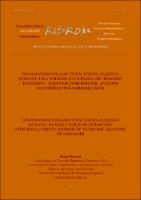Por favor, use este identificador para citar o enlazar este ítem:
https://repositorio.usj.es/handle/123456789/247
| Título : | Ius Romanum pragmaticum versus aequitas romana: una versión anticipada del binomio eficiencia/equidad, emblema del Análisis Económico del Derecho (AED) |
| Otros títulos : | IUS ROMANUM PRAGMATICUM VERSUS AEQUITAS ROMANA: AN EARLY VERSION OF BINOMIO EFFICIENCY / EQUITY, BANNER OF ECONOMIC ANALYSIS OF LAW (AED) |
| Autor: | Bernad Mainar, Rafael



|
| Palabras clave : | Utilitas; Aequitas; Iustitia; Derecho romano; Eficiencia; Equidad; Análisis Económico del Derecho (AED) |
| Fecha de publicación: | abr-2019 |
| Editorial : | Universidad de Castilla-La Mancha. Facultad de Derecho y Ciencias Sociales |
| Citación : | BERNAD, Rafael. Ius romanum pragmaticum versus aequitas romana: una versión anticipada del binomio eficiencia / equidad, emblema del análisis económico del Derecho (AED). RIDROM [on line]. 22-2019. ISSN 1989-1970. p. 55-192. <http://www.ridrom.uclm.es> |
| Resumen : | One of the essential attributes of Roman law is its pragmatic character, represented by the extra-legal value of the utilitas. In turn, the aequitas is presented as one of the basic principles that has shaped, both the Romanum Ius, as the same Roman society. Both elements, utilitas and aequitas, converge and complement each other in the Roman notion of iustitia. The leading role in the Roman Law of the triad (utilitas, aequitas, iustitia) can be redirected at present through the existing connection between the law and the economy, so that decision-making concerns, and recourse to the legal norm in that sense. We are entering, then, into a subject as controversial as it is exciting: the search for a balance between efficiency and equity, an emblematic aspect in the sphere of the economic analysis of law (AED). |
| Descripción : | Uno de los atributos esenciales del Derecho romano es su carácter pragmático, representado por el valor extrajurídico de la utilitas. A su vez, la aequitas se presenta como uno de los principios básicos que ha conformado, tanto el Ius Romanorum, como la misma sociedad romana. Ambos elementos, utilitas y aequitas, convergen y se complementan debidamente en la noción romana de iustitia. El protagonismo en el Derecho romano de la tríada señalada (utilitas, aequitas, iustitia) lo podemos reconducir en la actualidad a través de la conexión existente entre el derecho y la economía, por lo que a la toma de decisiones concierne, y el recurso a la norma jurídica en tal sentido. Nos adentramos, pues, en un tema tan polémico, como apasionante: la búsqueda del equilibrio entre eficiencia y equidad, un aspecto emblemático en la órbita del análisis económico del derecho (AED). |
| URI : | https://repositorio.usj.es/handle/123456789/247 |
| ISSN : | 1989-1970 |
| Aparece en las colecciones: | Artículos de revistas |
Ficheros en este ítem:
| Fichero | Descripción | Tamaño | Formato | |
|---|---|---|---|---|
| Ius Romanum pragmaticum versus aequitas romana una versión anticipada del binomio eficiencia-equidad, emblema del Análisis Económico del Derecho AED.pdf | 822,53 kB | Adobe PDF |  Visualizar/Abrir |
Este ítem está sujeto a una licencia Creative Commons Licencia Creative Commons

